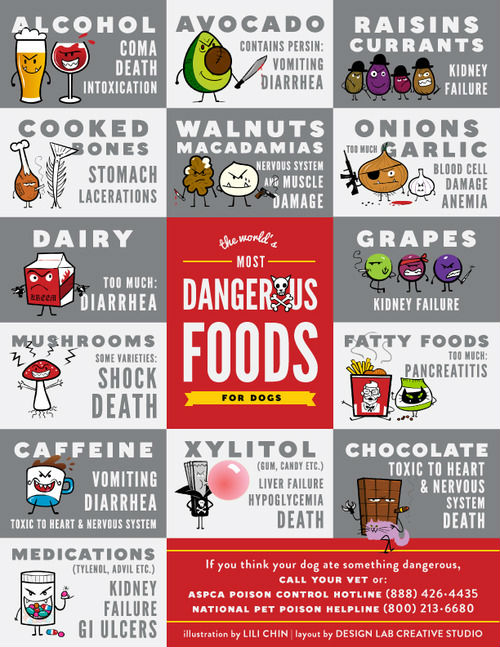Foods dogs should never eat are a growing concern for pet owners and veterinarians. Although, some foods we eat are okay for our pets — at all costs, dogs should avoid other types of food we consume.
Some foods can make a canine sick — while other food products can be deadly to animals like a dog.
The following is a list of human foods dogs should never eat. What to avoid and what to do in case of an emergency is provided, as well.

Foods Dogs Should Never Eat
Here’s a list of human foods you should never share with a dog.
- Avocados: Avocados contain a substance called persin that’s extremely toxic to animals. It’s not only the edible flesh of the avocado that’s toxic to pets; the entire avocado plant — including the leaves, bark, and seed contain persin. Persin can make an animal sick or kill any animals that ingests this fatty acid derivative. Make sure to keep avocados out of the reach of your pet.
- Bones: The U.S. Food and Drug Administration (FDA) advised pet owners to skip the bones when it comes to rewarding their dogs. Bones can break a dog’s teeth, cause mouth injuries, and get stuck in their stomach. A dog can also suffer severe bleeding from the rectum as a result of chewing on a bone.
- Onions: Onions fall into the category of foods dogs should never eat, as well. Onions can kill your pet. The levels of thiosulfate found in onions means that even small amounts could hurt and quickly kill your dog, cat, and other pets. Onions also contain allyl propyl disulfide, which causes permanent damage to red blood cells, causing anemia and oxygen deprivation. Animals that eat onions can suffer from anemia, difficulty breathing, discolored urine, dermatitis, and liver damage.
- Garlic: Although animals can digest small amounts of garlic powder, larger amounts can make them anemic. Garlic can also cause gastrointestinal problems. Thiosulfate — the chemical compound found in garlic — is difficult for dogs and cats to process. As bad as garlic is — it’s nothing when compared to the amount of thiosulfate found in onions.
- Chocolate: Chocolate contains theobromine, an alkaloid that’s chemically similar to caffeine. Although most people have no problem digesting the theobromine found in chocolate, it’s entirely different for dogs. They metabolize theobromine more slowly and can get sick and die from eating too much chocolate. How much chocolate is deadly depends on the type of chocolate. Baking chocolate can have up to 10 times as much theobromine as milk chocolate — and thousands times more than white chocolate does. It’s best to avoid giving dogs chocolate entirely to be safe.
- Alcohol: Even drinking a small amount of alcohol can result in significant intoxication for a dog, which can lead to vomiting, seizures and even death.
Poison Prevention for Pets
The following poster outlines some of the most dangerous human foods for dogs. It includes mushrooms, avocados, and walnuts.
The poster does not contain information about how much of each food is toxic to a dog because it can differ from animal to animal.
Dr. Jessica Vogelsang, one of the most widely read veterinarians on the Internet, offers the following comment about toxin exposure and foods dogs should never eat.
“Toxicity is not always linear. Sometimes a dog eats a bag of grapes and is fine and other times a dog eats one bite of pork fried rice and dies of pancreatitis. Sometimes only portions of a fruit are toxic and other parts are fine. Sometimes there are at least three variables that must be calculated before you know if a food was ingested at a toxic amount.”
Here are the world’s most dangerous foods for dogs
A dog may exhibit any of the following symptoms if they’ve eaten something toxic:
- Lack of appetite
- Diarrhea
- Vomiting
- Painful abdomen
- Lethargy
- Seizures
- Coma
See your veterinarian immediately if you suspect your dog or cat has ingested something toxic. In the event of an emergency, call the American Society for the Prevention of Cruelty to Animals (ASPCA) Animal Poison Control’s number. The phone-line is open 24 hours a day, 365 days a year. The number is 1-888-426-4435.
